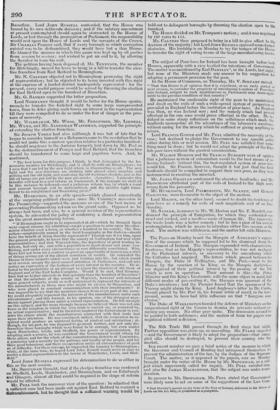The subject of Poor-laws for Ireland has been brought before
both Houses, apparently with a view to elicit the intentions Of Government, The matter was mentioned by Earl DARNLEY*, in the Lords, last night; but none of the Ministers made any answer to his suggestion for adopting a permanent provision for the poor. In the House of Commons, on Thursday, Mr. V. STEUART mo
" That this House is of opinion that it is expedient, at an early period of next session, to consider the propriety of introducing a system of Poor-laws into Ireland, subject to such modifications as Parliament may deem appli. cable to the peculiar condition of that country."
He maintained the unalienable right of the poor to be maintained, and dwelt on the evils of such a wide-spread system of pauperism as prevailed in England before the institution of poor-laws. As England was then, so was Ireland now ; and the remedy which had proved effectual in the one case would prove effectnal in the other. He indulged in some sharp reflections on the selfishness which made the landlords monopolize all the advantages of the labourer's exertions, without caring for the misery which he suffered or giving anything im return. Lord L FRANCIS GOWER and Mr. PEEL admitted the necessity of the case ; but declined to pledge the Government to any specific policy either during this or next session. Mr. PEEL was satisfied that something must be done ; but he would not adopt the principle of the English poor-laws without the greatest consideration.
Ma WILMOT HORTON and Sir FRANCIS BURDETT were of opinion that a judicious system of colonization would be the best means of relieving Ireland : without this, the best-regulated system of poor-laws would fail. Sir Francis, however, thought it but just that the Esti landlords should be compelled to support their own poor, as they were instrumental in creating the mischief.
Mr. JAMES GRATTAN condemned the absentee landlords ; and Air. BROWNLOW attributed part of the evils of Ireland to the high rents wrung from the peasantry.
Mr. HUSKISSON, Lord PALMERWON, Mr. SLANEY, and General GASCOYNE, were favourable to the object of the motion.
Lo0 MILTON, on the other hand, seemed to doubt the tendency of poor-laws as a remedy for evils of such magnitude and of so long standing.
Mr. SADLER, in answer to Mr. IV. Horton and Sir. F. Burdett, condemned the principle of Emigration, for which they contended—as cruel and wicked, and a needless waste of human life. The improvh; the waste lands was a better remedy ; but he has a plan of his own in contemplation, which he means to introduce either this session or the next. The motion was withdrawn, and the matter left with Ministers.


















 Previous page
Previous page